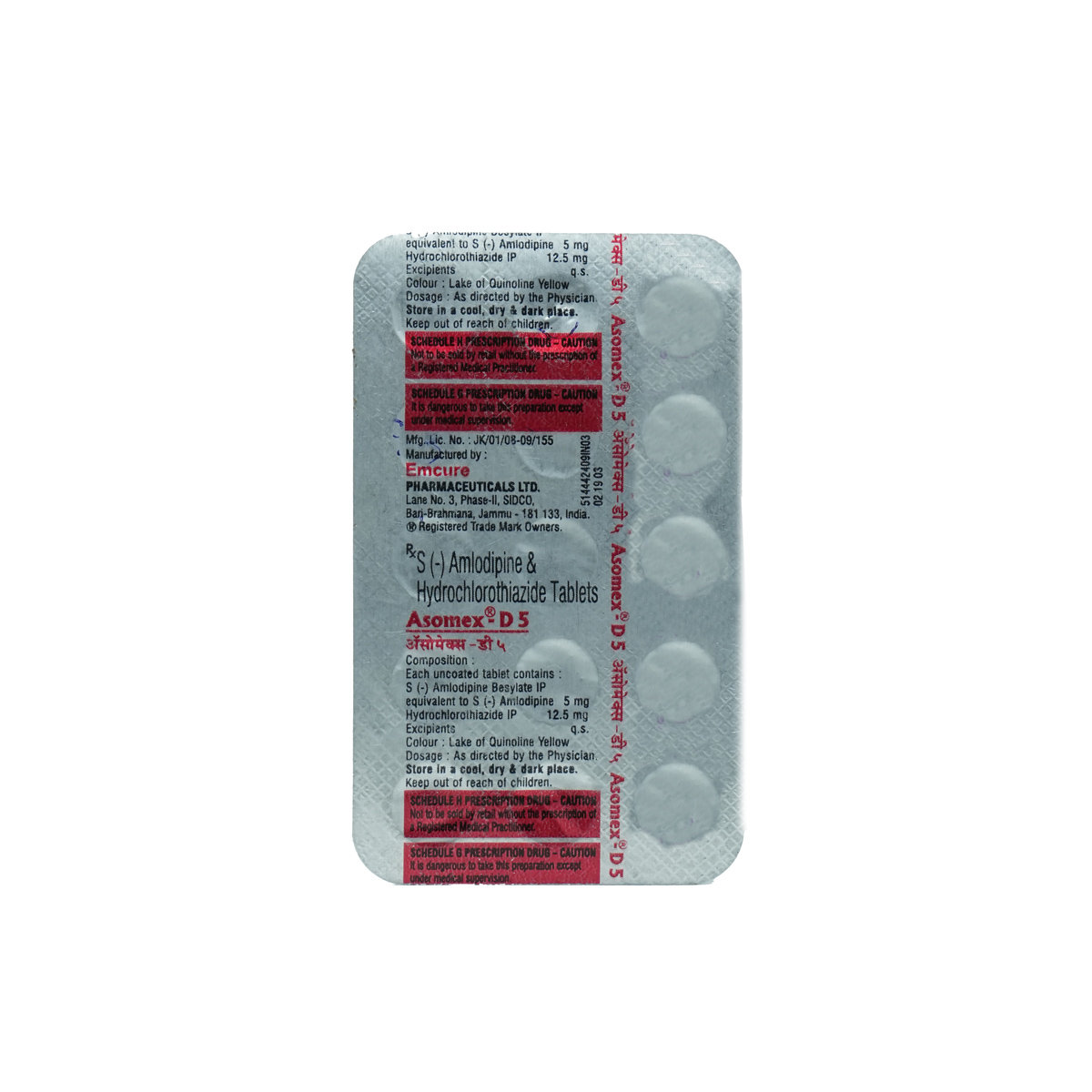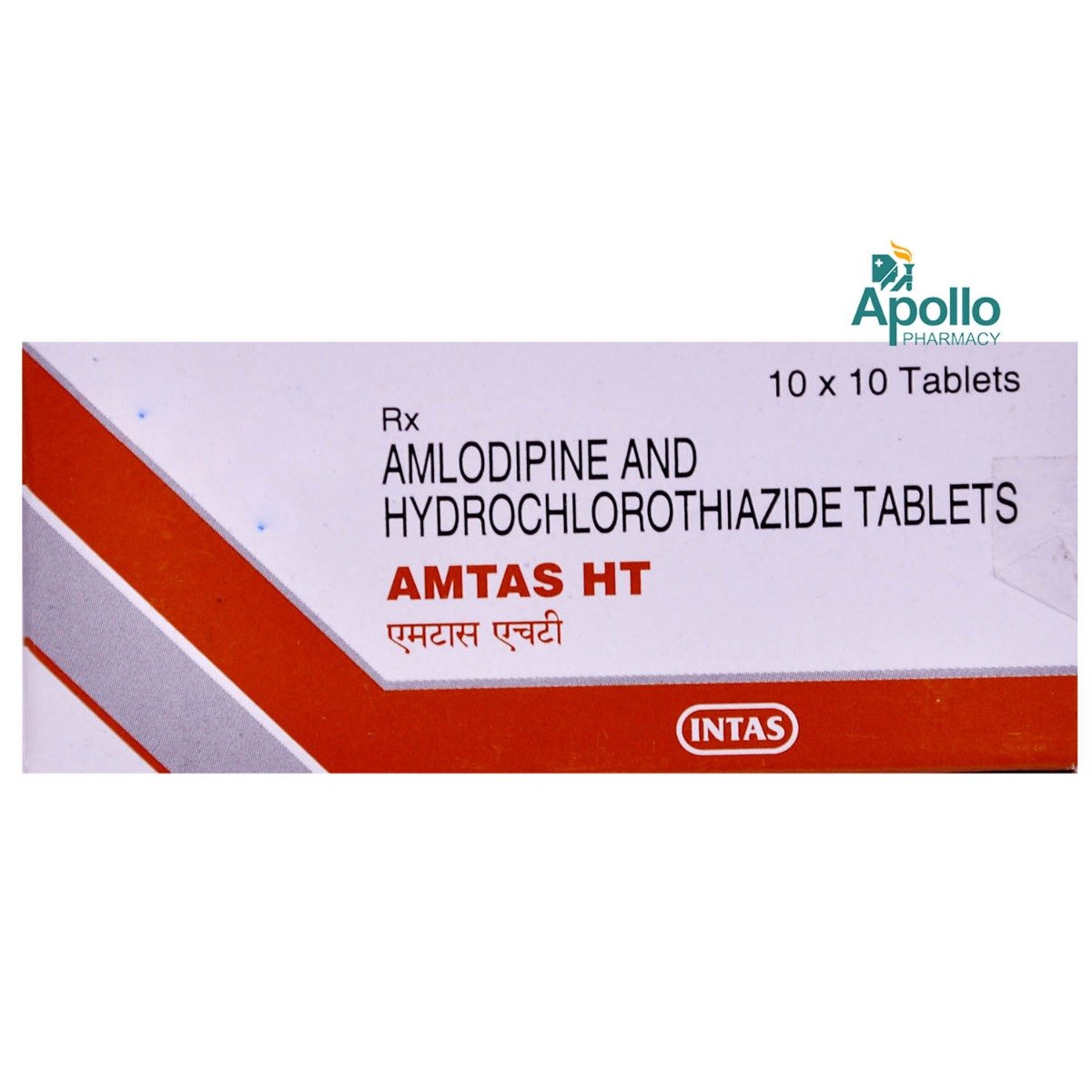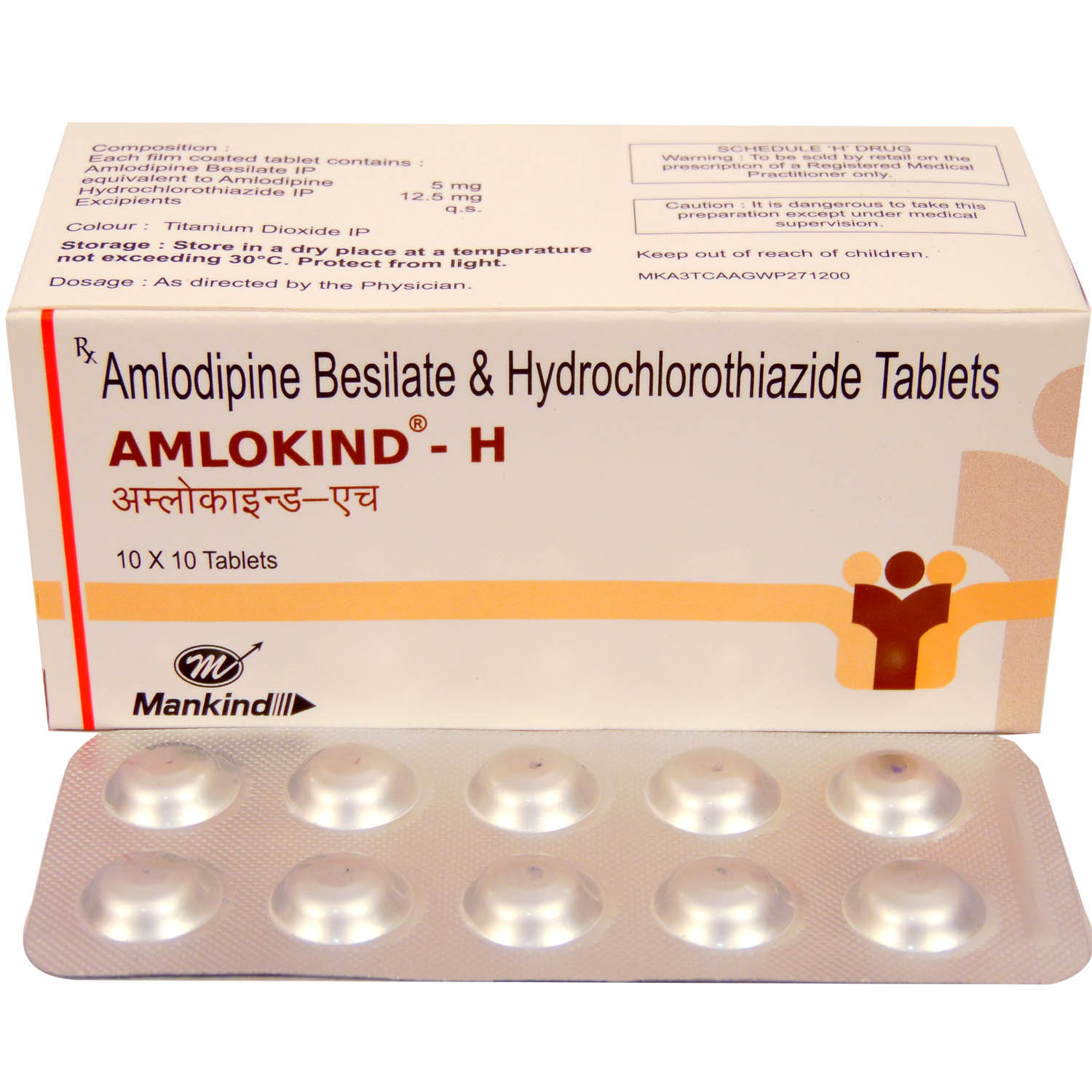Amlodipine+hydrochlorothiazide
About Amlodipine+hydrochlorothiazide
Amlodipine+hydrochlorothiazide belongs to the class of anti-hypertensives and is primarily taken for the treatment of hypertension (high blood pressure). Hypertension or high blood pressure is a chronic condition in which the force exerted by the blood against the artery wall is high. As a result, it leads to heart diseases, irregular heartbeat, and other complications. Edema may occur in case of high blood pressure where fluids of the body get trapped in the tissues of the hands, arms, feet, ankles, and legs leading to its swelling.
Amlodipine+hydrochlorothiazide is a combination of two medicines including Amlodipine and Hydrochlorothiazide which are antihypertensive medicines. Amlodipine is a calcium channel blocker and works by relaxing and widening the blood vessels. Hydrochlorothiazide is a diuretic and its function is to remove extra water and certain electrolytes from the body through urine. Amlodipine+hydrochlorothiazide helps to lower high blood pressure thus reduces the chances of future heart attack and stroke. Over time it also performs by relaxing vessels of blood and enhancing the flow of blood.
Take Amlodipine+hydrochlorothiazide as prescribed. You are advised to take Amlodipine+hydrochlorothiazide for as long as your doctor has prescribed it for you depending on your medical conditions. You may experience glucose intolerance (low or high level of glucose), ankle swelling, sleepiness, headache, (sense of heat in the face, ears, neck, and trunk), flushing, tiredness, nausea, decreased potassium level in the blood, Increased blood uric acid, and altered blood lipid level. Most of these side effects of Amlodipine+hydrochlorothiazide do not require medical attention and gradually resolve over time. However, if the side effects are persistent, reach out to your doctor.
Inform your doctor if you have had an allergic reaction to Amlodipine+hydrochlorothiazide, have liver disease, kidney disease, heart failure, a heart valve problem, or have a history of a heart attack. Immediately contact your doctor if you are pregnant or are planning to get pregnant, or are breastfeeding. Do not stop taking $ name without your doctor's advice. Sudden Stopping Amlodipine+hydrochlorothiazide may cause changes in your heart rhythm and blood pressure, cause chest pain, or a heart attack. Your doctor will lower your dose gradually over a period to help prevent these symptoms.
Uses of Amlodipine+hydrochlorothiazide
Medicinal Benefits
When you take Amlodipine+hydrochlorothiazide, it works by relaxing the blood vessels and making the heart more efficient at pumping blood throughout the body. It helps to lower high blood pressure thus reduces the chances of future heart attack and stroke. It removes the extra water and certain electrolytes from the body through urine.
Directions for Use
Storage
Side Effects of Amlodipine+hydrochlorothiazide
- Glucose intolerance (low or high level of glucose)
- Ankle swelling
- Sleepiness
- Headache
- Flushing (sense of heat in the face, ears, neck, and trunk)
- Tiredness
- Nausea
- Decreased potassium level in the blood
- Increased blood uric acid
- Altered blood lipid level
Drug Warnings
Amlodipine+hydrochlorothiazide should be used with extreme caution in patients with liver, kidney, cardiovascular diseases, and diabetic patients. Use only if the potential benefit justifies the potential risk. Immediately contact your doctor if you are pregnant or are planning to get pregnant, are breastfeeding. Do not stop taking $ name without your doctor's advice. Sudden Stopping Amlodipine+hydrochlorothiazide may cause changes in your heart rhythm and blood pressure, cause chest pain, or a heart attack. please consult your doctor, your doctor will weigh the benefits and any potential risks before prescribing it to you. Please consult your doctor.
Drug Interactions
Drug-drug interaction: Amlodipine+hydrochlorothiazide may have an interaction with medicines used to treat mood disorders such as (lithium), medicines used to treat heart disorders such as (digoxin), antidiabetic medicines such as (metformin), medicines used to treat erectile dysfunction such as (sildenafil), medicines used to lower cholesterol levels such as (simvastatin), ACE-inhibitor (such as enalapril, lisinopril, ramipril), and medicines used for immunosuppression such as (cyclosporine).
Drug-Food Interaction: Avoid foods with high fat or cholesterol. Avoid too much salt in your diet like pickles, extra salt on salad, etc. You are recommended not to consume alcohol along with Amlodipine+hydrochlorothiazide to avoid unpleasant side effects.
Drug-Disease Interaction: Amlodipine+hydrochlorothiazide should not be given to people with cardiogenic shock (when the heart fails to pump required blood to the body), heart valve problem (stenosis), low blood pressure (hypotension), liver disease, kidney disease, or heart failure, low serum potassium (hypokalemia), patients with nil urine output (anuria).
Drug-Drug Interactions Checker List:
Safety Advice

Alcohol
unsafeYou are recommended not to consume alcohol along with Amlodipine+hydrochlorothiazide to avoid unpleasant side-effects.

Pregnancy
cautionAmlodipine+hydrochlorothiazide is not recommended during pregnancy unless your doctor considers it essential. Your doctor will weigh the benefits and any potential risks before prescribing it to you.

Breast Feeding
cautionAmlodipine+hydrochlorothiazide should not be used when breastfeeding unless clearly necessary. Your doctor will weigh the benefits and any potential risks before prescribing it to you. Please consult your doctor.

Driving
unsafeIt is advised to drive with caution after taking Amlodipine+hydrochlorothiazide as it usually causes drowsiness and affects the driving ability.

Liver
cautionAmlodipine+hydrochlorothiazide to be taken with caution, especially if you have a history of liver diseases/conditions. Your doctor may adjust your dose depending upon your current liver conditions.

Kidney
cautionAmlodipine+hydrochlorothiazide to be taken with caution, especially if you have a history of Kidney diseases/conditions. Your doctor may adjust your dose depending upon your current kidney conditions.

Children
cautionAmlodipine+hydrochlorothiazide to be taken with caution, especially if you are children below the age of 12. Your doctor may adjust your dose depending upon your age.
Habit Forming
Diet & Lifestyle Advise
- Keep your weight under control with a BMI of 19.5-24.9.
- Do regular physical activity or exercise for at least 150 minutes per week, or about 30 minutes most days of the week. Doing this can help you to lower your raised blood pressure by about 5 mm of Hg.
- Avoid stress as it can raise your blood pressure. Try to enjoy and spent time with your loved ones to cope with stress and practice mindfulness techniques.
- Quitting smoking is the best strategy to lower the risk of heart disease.
- Option for a diet rich in whole grains, fruits, veggies, and low-fat dairy products.
- Limit intake of sodium chloride (table salt) in your daily diet to 2300 mg per day or less than 1500 mg is ideal for most adults.
- Try to include heart-healthy omega-3 fatty acids containing food drinks in your daily diet. You can also use low-fat cooking oil like olive oil, soybean oil, canola oil, and coconut oil can help in lowering your elevated blood pressure.
- Monitor your blood pressure daily and if there is too much fluctuation then immediately contact your doctor.
Special Advise
- It is advised to restrict salt intake in the diet.
Patients Concern
Disease/Condition Glossary
Hypertension: It is a chronic condition when blood pressure is too high. This condition can lead to hardened arteries (blood vessels), decreasing the blood and oxygen flow to the heart. Blood pressure is the measurement of the force that our heart uses to pump blood to all parts of the body. Raised blood pressure can cause chest pain (angina) and heart attack (when blood supply to the heart is blocked). Additionally, high blood pressure also causes brain damage (stroke) and kidney failure. High blood pressure can be diagnosed with the help of a blood pressure monitor or sphygmomanometer. Systolic pressure is the pressure when the heart pumps blood out. On the other hand, diastolic pressure is the pressure when your heart is at the resting stage between heartbeats. If your blood pressure is 140/90 mm of Hg, it means the systolic pressure is 140 mm of Hg and, diastolic pressure is 90 mm of Hg. Ideal blood pressure should be between 90/60 mm of Hg and 120/80 mm of Hg.
FAQs
No, you are advised to inform your doctor and monitor your blood pressure for at least two weeks before stopping the medicine. Depending upon your current blood pressure readings, there is a possibility your doctor may lower your medicine dosage and not recommend to discontinue it.
In case, If you forget to take Amlodipine+hydrochlorothiazide at any time, take it as soon as you remember, then continue to take it at the usual times. Do not take a double dose to make up for a forgotten dose.
Yes, Amlodipine+hydrochlorothiazide may cause dizziness. It is advised to avoid driving or operate any heavy machinery while taking Amlodipine+hydrochlorothiazide. In case you feel dizzy or light-headed, it is advised to rest for some time until you feel better.
Amlodipine+hydrochlorothiazide can be safely taken as long as your doctor has prescribed it to you. Conditions such as high blood pressure are life-long conditions, and one should not abruptly discontinue it without discussing it with a doctor.
No, it is a prescribed drug, given by a physician for preventing specific medical conditions. Taking it on your own can cause unwanted side-effects.










